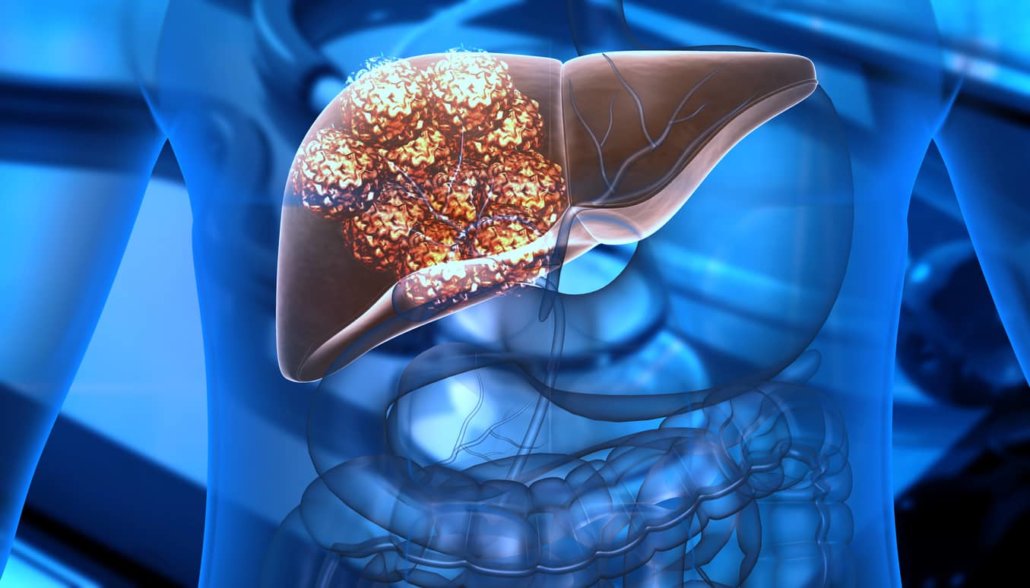Liver metastases – multiple causes
Liver metastases occur when cancer cells spread throughout the body via the bloodstream or lymph from the primary tumor and settle in the liver. Symptoms such as vomiting or nausea usually appear very late. Daughter tumors (metastases) in the liver usually develop in the course of advanced cancer stages in the breast, intestine and lung. However, they can also be due to stomach cancer, esophageal cancer, or pancreatic cancer.
Every 20th cancer patient
has metastases in the liver
Primary tumors
are usually located in the chest, intestines or lungs
Source: German Cancer Society
Where can you have lung metastases treated in Munich?
The treatment of patients with liver metastases can be carried out with the help of various procedures. Our radiotherapists work together with colleagues from other disciplines to develop an optimal, individual treatment plan for the best possible therapy.

Treatment of liver metastases
In order for the physician to work out the right treatment together with the patient, he must know which primary cancer the metastases are based on. Therefore, the attending physician develops the most appropriate treatment plan together with our specialists in diagnostics and therapy.
How are liver metastases treated?
Metastases consist of tissue cells from the main tumor. Accordingly, these cells respond differently to certain treatment methods. The location, number and size of the metastases and the patient’s general health additionally play an important role in choosing the right therapy.
Radiotherapy
Radiotherapy is useful for patients whose metastases are inoperable or whose state of health does not allow surgery. Stereotactic radiation therapy uses high-intensity beams. Here, the rays are focused on the metastasis from outside the body through the skin, so that only the tumor, but not the surrounding healthy tissue, is damaged. The precise alignment of the beams is made possible by modern imaging techniques.
Operation
Individual, small metastases can usually be removed quite well surgically. It is crucial for the healing success that these can be completely removed. Because healthy tissue is also removed during surgery, it is important to ensure that enough liver tissue remains for liver function and regeneration. However, surgery is often not possible. In this case, alternative, additional treatment methods must be used.
Chemotherapy
If surgery is not possible, for example because the metastases diffuse through the liver, then chemotherapy can be used before surgery(neoadjuvant chemotherapy). The drugs used in chemotherapy(cytostatics) inhibit the growth and spread of cancer cells. This can reduce the size and localize the daughter tumors, allowing for subsequent surgery. Adjuvant chemotherapy (after surgery) reduces the likelihood that remaining metastases will continue to grow or that new metastases will form.
Radiofrequency therapy
Radiofrequency therapy or radiofrequency ablation destroys liver metastases using heat. In this procedure, a probe is placed in the metastasis. The probe generates heat through electric current, whereupon the metastasis is heated and destroyed.
What is the treatment process in our practices?
What do you need to pay attention to before, during and after treatment?
The appearance of metastases usually indicates advanced cancer. For this reason, many patients must expect that the cancer can only be treated palliatively due to the spread of cancer cells in the body. In many cases, a cure is no longer possible.
For this reason, regular checks after treatment are essential. Imaging procedures such as a CT scan and/or MRI are used to determine whether the cancer may have spread or whether new metastases have formed. Exchanges between the attending physician and the patient are also important to identify potential deteriorations in the patient’s overall health. Follow-up care is important because a relapse (recurrence) can be detected quickly and appropriate measures can be taken at an early stage.
Therefore, we ask you to inform your doctor immediately if your condition worsens. Please also address any distressing side effects. Your doctor will be happy to advise you on possible solutions and treatment options.
What are the side effects of liver metastases treatment?
The physician develops the best possible treatment plan together with the patient. This is to fight the main tumor and metastases as best as possible. At the same time, the patient’s state of health should not be excessively strained. Nevertheless, side effects may occur in the course of treatment and even afterwards.
Surgery for metastases may result in pain, wound infection, or wound healing problems. Depending on which areas of the liver were operated on and how much volume of the liver was removed, it may take some time for the liver to return to full function. Blood counts may also be affected by the procedure.
The cytostatic drugs used in chemotherapy interfere with the growth of rapidly dividing cells. This affects cancer cells, but also healthy blood, hair and mucous membrane cells. Therefore, side effects such as fatigue, exhaustion, weakened immune system, mucosal inflammation, diarrhea and hair loss may occur.
In rare cases, liver damage or intestinal bleeding may be observed during radiation therapy. In addition, nausea and vomiting may occur, as well as fatigue and loss of appetite.




